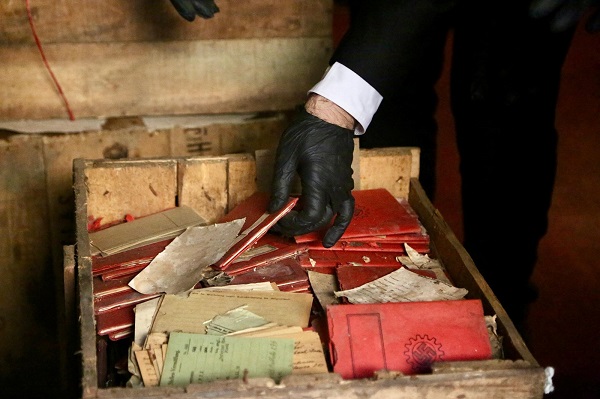 Nazi-related material that was originally confiscated by local authorities when it was shipped to Argentina in 1941 - discovered recently by chance in the archives of the Supreme Court, in Buenos Aires, Argentina, 11 May 2025;
Credit: Corte Suprema de Justicia de la Republica Argentina/Handout via Reuters
Nazi-related material that was originally confiscated by local authorities when it was shipped to Argentina in 1941 - discovered recently by chance in the archives of the Supreme Court, in Buenos Aires, Argentina, 11 May 2025;
Credit: Corte Suprema de Justicia de la Republica Argentina/Handout via Reuters
BUENOS AIRES (Reuters) - Dozens of boxes of Nazi material confiscated by Argentinean authorities during World War II were recently rediscovered in the Supreme Court's basement, the court said on Sunday 11 May 2025.
The 83 boxes were sent by the Germany embassy in Tokyo to Argentina in June 1941 aboard the Japanese steamship "Nan-a-Maru", according to the history that the court was able to piece together, it said in a statement.
At the time, the large shipment drew the attention of authorities, who feared its contents could affect Argentina's neutrality in the war.
Despite claims at the time from German diplomatic representatives that the boxes held personal items, Argentine customs authorities searched five boxes at random.
They found postcards, photographs and propaganda material from the Nazi regime, as well as thousands of notebooks belonging to the Nazi party. A federal judge confiscated the materials and referred the matter to the Supreme Court.
It was not immediately clear why the items were sent to Argentina or what, if any, action the Supreme Court took at the time.
84 years later, court staffers came across the boxes as they prepared for a Supreme Court museum.
"Upon opening one of the boxes, we identified material intended to consolidate and propagate Adolf Hitler's ideology in Argentina during the Second World War," the court said.
The court has now transferred the boxes to a room equipped with extra security measures, and invited the Holocaust Museum in Buenos Aires to participate in their preservation and inventory.
Experts will also examine them for any clues about still-unknown aspects of the Holocaust, such as international financing networks used by the Nazis.
Argentina remained neutral in World War II until 1944, when it broke relations with Axis powers. The South American country declared war on Germany and Japan the following year.
From 1933 to 1954, according to the Holocaust Museum, 40,000 Jews entered Argentina as they fled Nazi persecution in Europe. Argentina is home to the largest population of Jews in Latin America.








